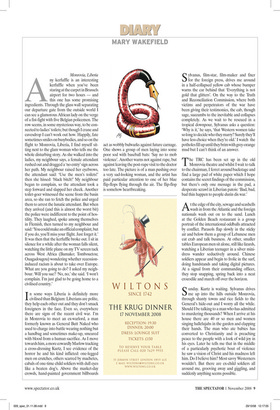Monrovia, Liberia A ny kerfuffle is an interesting kerfuffle when you’ve
been staring at the carpet in Brussels airport for two hours — and this one has some promising ingredients. Through the glass wall separating our departure gate from the outside world I can see a glamorous African lady on the verge of a fist-fight with five Belgian policemen. The row seems, in some mysterious way, to be connected to ladies’ toilets; but though I crane and eavesdrop I can’t work out how. Happily, fate sometimes smiles on busybodies, and so on the flight to Monrovia, Liberia, I find myself sitting next to the glam woman who tells me the whole disturbing story. As she walked into the ladies, my neighbour says, a female attendant rushed out and dragged a ‘no entry’ sign across her path. My neighbour raised her eyebrows, the attendant said: ‘Use the men’s toilets!’ then she hissed: ‘black bitch!’ My neighbour began to complain, so the attendant took a step forward and slapped her cheek. Another toilet-goer witnessed the scene from the basin area, so she ran to fetch the police and urged them to arrest the lunatic attendant. But when they arrived (and this is almost the worst bit) the police were indifferent to the point of hostility. They laughed, spoke among themselves in Flemish, then turned to my neighbour and said: ‘You could make an official complaint, but if you do, you’ll miss your flight. Just forget it.’ It was then that the kerfuffle broke out. I sit in silence for a while after the woman falls silent, watching the little plane on my TV screen tack across West Africa (Bamako; Tombouctou; Ouagadougou) wondering whether recessioninduced racism is about to take over Europe. What are you going to do? I asked my neighbour. Will you sue? ‘No, no,’ she said. ‘I won’t complain. I’m just glad to be going home to a civilised country.’ In some ways Liberia is definitely more civilised than Belgium: Liberians are polite, they help each other out and they don’t smack foreigners in the face. Even so, everywhere there are signs of the recent civil war. I’m in Monrovia to meet an ex-warlord, a man formerly known as General Butt Naked who used to charge into battle wearing nothing but a handbag and sometimes make-up, smeared with blood from a human sacrifice. As I move towards him, a more cowardly Marlow tracking a cross-dressing Kurtz, I see evidence of the horror he and his kind inflicted: one-legged men on crutches, others scarred by machetes, cabals of one-time child soldiers with dull eyes like a beaten dog’s. Above the market-day crowds, hand-painted government billboards act as wobbly bulwarks against future carnage. One shows a group of men laying into some poor sod with baseball bats: ‘Say no to mob violence’. Another warns not against rape, but against leaving the post-rape visit to the doctor too late. The picture is of a man pushing over a very sad-looking woman, and the artist has paid particular attention to one of her blue flip-flops flying through the air. The flip-flop is somehow heartbreaking. Sylvanus, film-star, film-maker and fixer for the foreign press, drives me around in a half-collapsed yellow cab whose bumper warns the car behind that ‘Everything is not gold that glitters’. On the way to the Truth and Reconciliation Commission, where both victims and perpetrators of the war have been giving their testimonies, the cab, though sage, succumbs to the inevitable and collapses completely. As we wait to be rescued in a tropical downpour, Sylvanus asks a question: ‘Why is it,’ he says, ‘that Western women take so long to decide who they marry? Surely they’ll have less choice when they’re old.’ I watch the potholes fill up until they brim with grey-orange mud but I can’t think of an answer.
The TRC has been set up in the old Monrovia theatre and whilst I wait to talk to the chairman, I ferret around backstage and find a large pad of white paper which I hope contains the secret findings of the commission, but there’s only one message in the pad, a desperate scrawl in Liberian patois: ‘Bad, bad, bad thin happen to people durin dis war.’ At the edge of the city, sewage and seashells wash in from the Atlantic and the foreign nationals wash out on to the sand. Lunch at the Golden Beach restaurant is a group portrait of the international oddballs attracted by conflict. Parasols flap slowly in the sticky air and below them a group of Lebanese men eat crab and talk business. At other, smaller tables European men sit alone, still like lizards, watching a Liberian teenager in a silver minidress wander seductively around. Chinese soldiers appear and begin to frolic in the surf, doing handstands and taking digital pictures. At a signal from their commanding officer, they stop snapping, spring back into a neat crocodile and march off over the horizon.
Sunday. Kurtz is waiting. Sylvanus drives me up into the hills outside Monrovia, through shanty towns and rice fields to the General’s hide-out and I worry all the while. Should I be talking to a man who has admitted to murdering thousands? When I arrive at his house there are 40 or so men and women singing hallelujahs in the garden and clapping their hands. The man who ate babies has converted to Christianity and is preaching peace to the people with a look of wild joy in his eyes. Later he tells me that in the middle of a particularly psychotic bout of violence he saw a vision of Christ and his madness left him. Do I believe him? Most savvy Westerners wouldn’t. But there are ex-child soldiers all around me, grooving away and giggling, and suddenly anything seems possible.


































































































 Previous page
Previous page